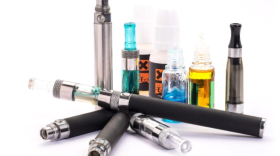The Food and Drug Administration and the surgeon general are calling the use of e-cigarettes, or vapes, among teenagers an “epidemic.” One report shows teen vaping increasing almost 80 percent in the last year and claimed about 3.6 million middle and high school students vape on a regular basis. Carolyn Murray has this report:
Nicotine is identified along with alcohol, Heroin, Cocaine and Barbiturates as one of the five most addictive drugs. Michael Measom is a Board-Certified Psychiatrist specializing in addiction medicine. He told KPCW it can take just one day of exposure to create a lifetime of nicotine dependence.
“I have concerns about kids using nicotine and the uses increasing. You know nicotine is one of those very, very abusive substances. You know kids can use nicotine and be addicted in one day and struggle with addiction for the rest of their life. I have concerns about THC as well, but nicotine is absolutely a gateway drug."
Measom said the chemicals in the nicotine and THC vaping products can cause cancer.
“Vaping itself has chemicals in there as well that we’re not sure about the safety. I see people all the time who vape nicotine thinking that it’s going to help them quit smoking and the data is pretty clear that the people who use nicotine end up smoking cigarettes as well. But we have to be honest, there’s actually less chemicals in there than in a normal cigarette. It’s not the nicotine that causes cancer, it’s the other chemicals in the cigarette that causes cancer."
Measom said the marketing efforts by vape companies, which are also tobacco interests, have made the practice appealing to young people.
“Yeah, it’s increased lately, and I think part of it has to do with marketing from the industry. You know, I think they have great flavors that appeal to younger people like bubble gum flavor, green apple flavor…you know, candy-like flavors.”
Measom said kids experimenting with substances seems to be more a rule than the exception. THC is available in so many forms and he said it has addictive potential too.
“THC is addictive. The potency is greatly increased. You know, like mentioned before, with the flavors with nicotine vaping, now a days you buy cookie and gummies. You know, it’s a way to appeal to young kids. It does have that addictive potential. It’s very hard to overdose on marijuana. It’s very hard to have super high concentrations of marijuana when smoking a marijuana cigarette. But there’s probably an increased risk with vaping and getting things with really high concentration.”
The Centers for Disease Control states that every day, more than 3,800 youth younger than 18 years smoke their first cigarette. Campaigns to warn people about the dangerous health effects of smoking cigarettes have pervaded American culture for several decades. But Measom said he doesn’t see those same efforts underway for vaping.
“I have not seen those on any of the products shown to me. I don’t think we have those warnings. To be honest with you , I don’t’ how much those warnings do once somebody becomes addicted."
Measom has seen kids vaping and hiding the device in their sleeves. He concedes that using a vape for nicotine is still better than smoking cigarettes but said the data shows people who vape nicotine also smoke cigarettes. He said nicotine is so highly addictive that it’s important for parents to talk often to their kids about the health issues and risks of vaping chemicals into their bodies.






